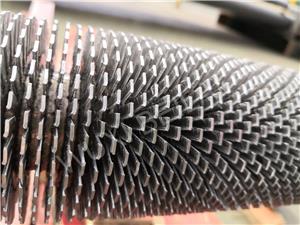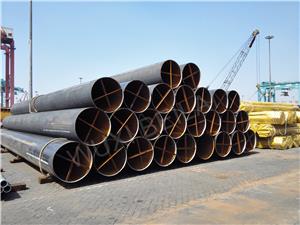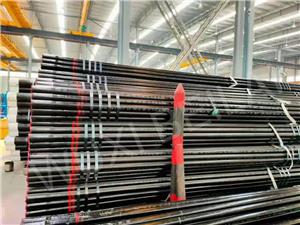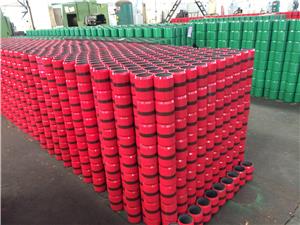Linepipe: Steel Pipelines for Transporting Petroleum, Natural Gas, Oil, and Water
A linepipe is a specialized steel pipeline used primarily for transporting petroleum, natural gas, oil, and water across vast distances. These pipelines are often deployed in regions with challenging environmental conditions, such as polar areas, ice fields, deserts, and oceans. Due to the extended length of these pipelines and the difficulty of maintenance, they must meet rigorous quality standards and technical specifications. Linepipe steel is typically composed of high-strength carbon steel and can be manufactured as either seamless or welded steel tubes. These pipes are designed to withstand the harsh conditions of cold climates, high-sulfur environments, or even underwater installation.
Advantages of Steel Linepipe
Steel linepipe offers several key advantages that make it suitable for demanding applications, including:
Mechanical Strength: The pipeline must possess significant wall thickness, high tensile strength, toughness, and resistance to wear. It should also feature large diameters, excellent weldability, resistance to low temperatures, and be capable of withstanding corrosion from CO2, seawater, and other aggressive environmental factors. Additionally, it should demonstrate resistance to Hydrogen-Induced Cracking (HIC) and Sulfide Stress Corrosion Cracking (SSCC).
High Strength: Steel linepipes are engineered for high tensile and yield strength, with a buckling ratio ranging from 0.85 to 0.93, making them durable even under extreme pressures.
High Impact Toughness: The toughness of the steel is crucial for preventing cracking, especially in extreme conditions where physical impact may be a concern.
Low Ductile-Brittle Transition Temperature: To handle severe regional and climatic challenges, the pipeline steel must have a low ductile-brittle transition temperature. A critical measure in this regard is the shear area from the Drop Weight Tear Test (DWTT). A minimum fracture shear area of 85% at the lowest operational temperature is generally required to prevent brittle failure.
Resistance to HIC and SSCC: Excellent resistance to hydrogen-induced cracking and sulfide stress corrosion cracking is essential, particularly in sour gas and high-sulfur environments.
Good Weldability: Steel linepipes are designed for easy welding, ensuring secure and durable joints along the pipeline.
Key Standards for Steel Linepipe
Several technical standards govern the design, manufacture, and use of steel linepipes in oil and gas transportation. The most prominent of these standards include:
API SPEC 5L: A widely used specification developed by the American Petroleum Institute (API). It outlines the requirements for steel pipe products but does not address pipeline design, selection, or installation.
DNV-OS-F101: This specification, developed by DNV GL (formerly Norske Veritas), is specifically for subsea pipeline systems. It covers a broad range of topics, including pipeline design, materials, manufacturing, installation, testing, operation, and maintenance. DNV-OS-F101 is generally more stringent than API SPEC 5L, especially for subsea applications.
ISO 3183: Developed by the International Organization for Standardization (ISO), this standard provides delivery conditions for oil and gas transportation steel pipes. It is comprehensive and detailed, although it does not cover pipeline design, installation, or other construction-related aspects.
These standards help ensure that steel linepipes meet the necessary performance criteria, including durability, safety, and efficiency, while adhering to global best practices for the transportation of oil, gas, and other fluids.
Additional Benefits of Steel Linepipe
Corrosion Resistance: Steel linepipes are specifically designed to resist corrosion from both natural and industrial sources. This includes protection against external corrosion from soil, moisture, and atmospheric conditions, as well as internal corrosion from the transported fluids. Specialized coatings and material treatments can enhance corrosion resistance, making steel linepipes particularly suited for challenging environments like offshore and high-sulfur regions.
Long-Service Life and Durability: Steel linepipes are known for their longevity and robustness, often designed to last several decades with minimal maintenance. Their durability is crucial for minimizing the need for repairs or replacements in remote and hard-to-reach locations. This makes them a cost-effective solution over time, reducing the overall lifecycle cost of the pipeline system.
These additional benefits further enhance the value of steel linepipes, ensuring they provide safe, reliable, and efficient transportation of fluids under a variety of environmental conditions.
Steel linepipes play a vital role in the safe and efficient transportation of oil, gas, and other fluids across vast distances, particularly in challenging environments. Their numerous advantages, including mechanical strength, impact toughness, corrosion resistance, and long service life, make them an essential component of modern energy infrastructure. By adhering to internationally recognized standards, steel linepipes ensure reliability, safety, and performance in the most demanding conditions. As the global demand for energy continues to grow, the importance of robust and durable linepipe systems will only increase, solidifying their place as a cornerstone of energy transport.




